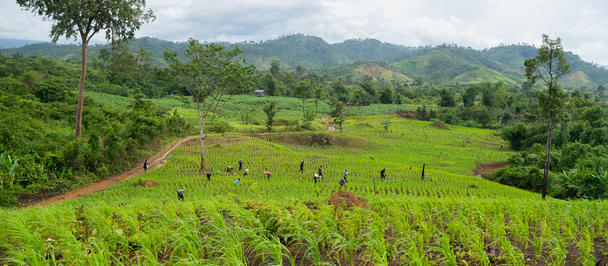Statement by Mrs. Alissar Chaker, UNDP Resident Representative
Reflective workshop on national implementation of the 4th COMMIT Sub-regional Plan of Action (SPAIV) and 1st national consultative workshop on development of Trans-national Referral Mechanism (TRM)
June 14, 2022

Excellencies
- Ketebandith Ing Kanthaphavi, Minister of Women’s Affairs,
- Hou Samith, Secretary of State, Ministry of Women’s Affairs and Chair of the Cambodian COMMIT Taskforce,
- Nhek Vannara, Secretary of State, Ministry of Social Affairs, Veterans and Youth Rehabilitation,
- Sea Kosal, Secretary of State, Ministry of Foreign Affairs and International Cooperation,
- Keng Somarith, Secretary of State, Ministry of Justice
- Carmen Moreno, Ambassador of the European Union to the Kingdom of Cambodia
- Distinguished Guests, Colleagues, Friends from the Media, Ladies and Gentlemen,
A very good morning to all.
It’s a great pleasure to be with you today in person after a long period of social distancing and virtual meetings. COVID-19 has changed our lives. It surely brought opportunities (I can think of the acceleration of digital transformation for example), but also challenges. It especially amplified the risks of vulnerable men, women, and children to trafficking and exploitation. It also accelerated the emergence of new trends of exploitation associated with COVID-19-induced socio-economic vulnerabilities. For example, traffickers shifted to cyber-criminality making it more complex to identify, protect, and support the reintegration of trafficked persons. This is in addition to borders reopening and people seeking again opportunities abroad, running the risk of opportunistic criminals seeking to take advantage of their vulnerability. While the challenges have increased, they also provide an opportunity to re-evaluate how we work together across borders to deliver rights-based responses that engage all our governments and our societies at large to raise awareness, empower people, and control this social evil.
There are over 5 million migrants circulating in the Greater Mekong Subregion¹. Cambodia is a major country of origin for migrants, with over 1,100,000 citizens working abroad in 2020, 54 % of whom are women (UNDESA). As we all know, the contribution of Cambodian migrants to the development of Cambodia, their host countries, and consequently the region cannot be underestimated. For instance, remittances contributed 5.6% of Cambodia’s GDP in 2019 and 4.9% in 2020 during COVID-19 (World Bank Data)².
Under its tenure as secretariat of the Coordinated Mekong Ministerial Initiative against Trafficking, known as the COMMIT Process, UNDP accompanied several advances towards delivering protection, support, and sustainable reintegration of trafficked persons. Starting in 2014 beginning with the elevation of human trafficking as national priority, to the launch of the Five-year National Strategic Plan for Counter-Trafficking in Persons (2019-2023), and the strengthened bilateral cooperation, especially with Thailand, Vietnam, and China. We hope that this accumulated experience and the reflection during the next two days on achievements and challenges faced during the implementation of the COMMIT 4th Sub-Regional Plan of Action will strengthen joint action and consolidate a stronger shared vision for rights-based counter-trafficking for the upcoming 5th COMMIT Sub-regional Plan of Action (SPAV).
Tomorrow is critical as you will start the co-creation of a Transnational Referral Mechanism (TRM) to ensure trafficked persons are accurately identified, referred, and reintegrated into society. Your technical expertise and experience in transborder coordination is key in this respect. I am sure that the facilitation team and the distinguished speakers will manage to engage you and to unravel insights, discuss common successes to be celebrated, define challenges, and most importantly identify solutions that will benefit those who have experienced exploitation.
The upcoming Inter-ministerial Meeting of the COMMIT process in August will be a good opportunity to show Cambodia’s leadership and showcase its successes in protecting trafficked persons. This comes within a wider effort which includes:
- First, implementing the Global Compact on Migration, where Cambodia is demonstrating leadership as champion country.
- Second, responding to the needs of returned migrants and harnessing the potential of migration for development, contributing to a systemic change for a more equitable and sustainable development pathway for Cambodia and the region.
UNDP is committed to support the government and the people of Cambodia in accelerating the country’s development in line with the 2030 Agenda and the Cambodia SDGs, leaving no one behind. Thus, we are proud to be part of this partnership and to contribute to meeting the needs and ensuring the inclusion of people on the move.
To end my word, I would like to thank our national partners, the Ministry of Women’s Affairs- the co-organizer of this event, the Ministry of Social Affairs, Veterans and Youth Rehabilitation, the National Committee for Counter Trafficking in Persons (NCCT) and the civil society. My gratitude also goes to UN sister agencies, namely, IOM and ILO, and to the European Union for their contributions to the Ship to Shore Rights programme. Most importantly, thanks to you all present today and tomorrow for your time and commitment to stopping and protecting vulnerable people from exploitation and trafficking, and upholding their dignity and human rights to live in liberty and security, free from slavery, torture, and degrading treatment.
Thank You.

 Locations
Locations



